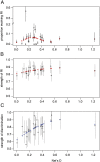Genetic divergence and the number of hybridizing species affect the path to homoploid hybrid speciation
- PMID: 30209213
- PMCID: PMC6166845
- DOI: 10.1073/pnas.1809685115
Genetic divergence and the number of hybridizing species affect the path to homoploid hybrid speciation
Abstract
Hybridization is often maladaptive and in some instances has led to the loss of biodiversity. However, hybridization can also promote speciation, such as during homoploid hybrid speciation, thereby generating biodiversity. Despite examples of homoploid hybrid species, the importance of hybridization as a speciation mechanism is still widely debated, and we lack a general understanding of the conditions most likely to generate homoploid hybrid species. Here we show that the level of genetic divergence between hybridizing species has a large effect on the probability that their hybrids evolve reproductive isolation. We find that populations of hybrids formed by parental species with intermediate levels of divergence were more likely to mate assortatively, and discriminate against their parental species, than those generated from weakly or strongly diverged parental species. Reproductive isolation was also found between hybrid populations, suggesting differential sorting of parental traits across populations. Finally, hybrid populations derived from three species were more likely to evolve reproductive isolation than those derived from two species, supporting arguments that hybridization-supplied genetic diversity can lead to the evolution of novel "adaptive systems" and promote speciation. Our results illustrate when we expect hybridization and admixture to promote hybrid speciation. Whether homoploid hybrid speciation is a common speciation mechanism in general remains an outstanding empirical question.
Keywords: Drosophila; homoploid; hybridization; mating behavior; speciation.
Copyright © 2018 the Author(s). Published by PNAS.
Conflict of interest statement
The authors declare no conflict of interest.
Figures



References
-
- Anderson E, Stebbins GLJ. Hybridization as an evolutionary stimulus. Evolution. 1954;8:378–388.
-
- Rieseberg LH, Van Fossen C, Desrochers AM. Hybrid speciation accompanied by genomic reorganization in wild sunflowers. Nature. 1995;375:313–316.
-
- Leducq J-B, et al. Speciation driven by hybridization and chromosomal plasticity in a wild yeast. Nat Microbiol. 2016;1:15003. - PubMed
-
- Lamichhaney S, et al. Rapid hybrid speciation in Darwin’s finches. Science. 2018;359:224–228. - PubMed
Publication types
MeSH terms
Associated data
Grants and funding
LinkOut - more resources
Full Text Sources
Other Literature Sources
Molecular Biology Databases

